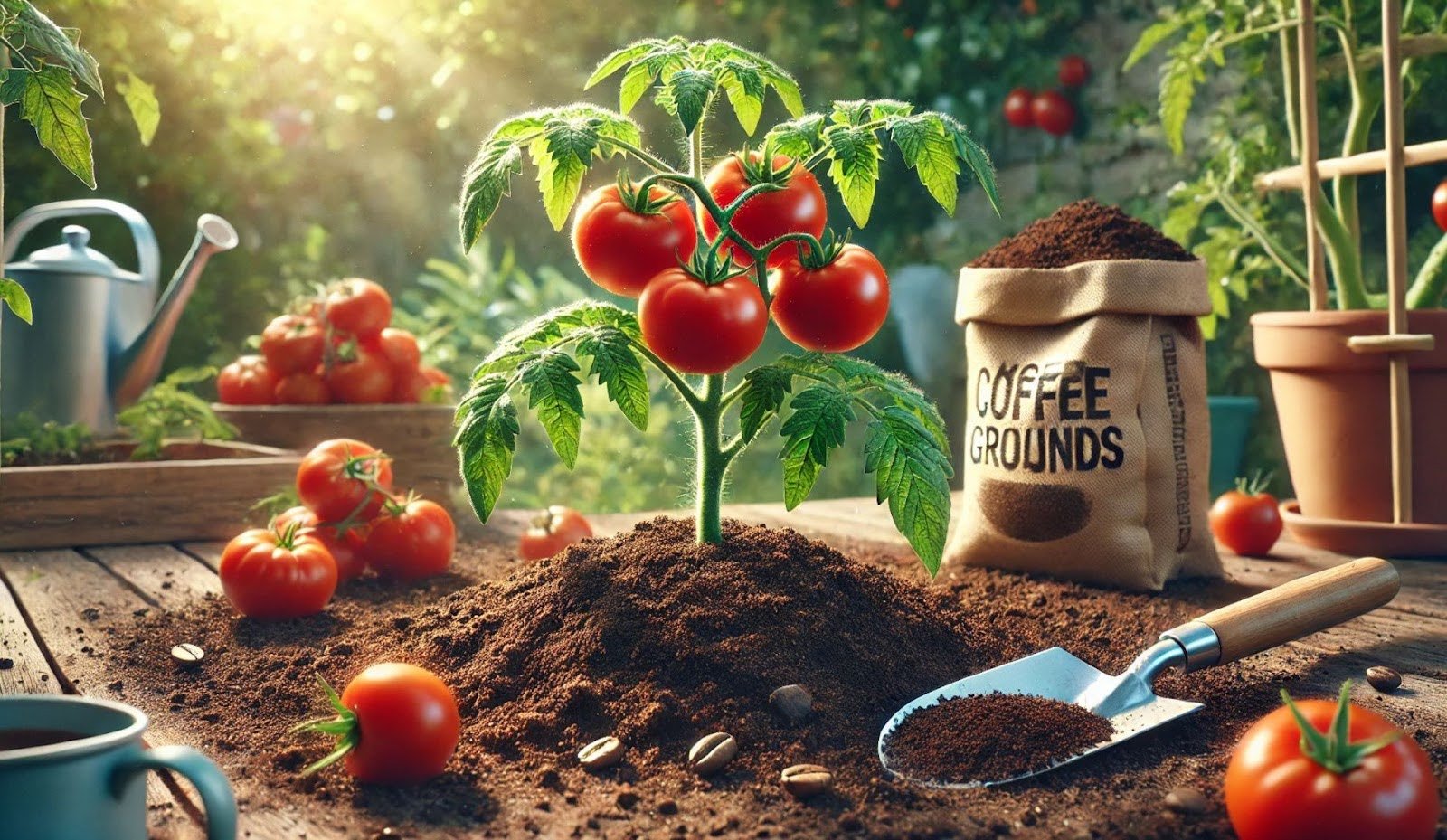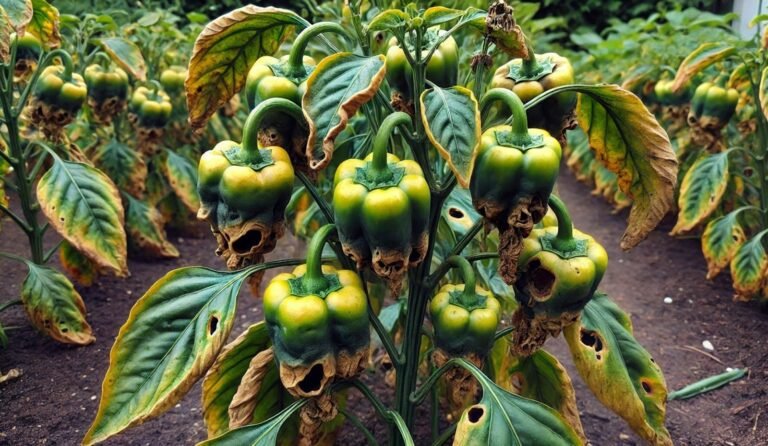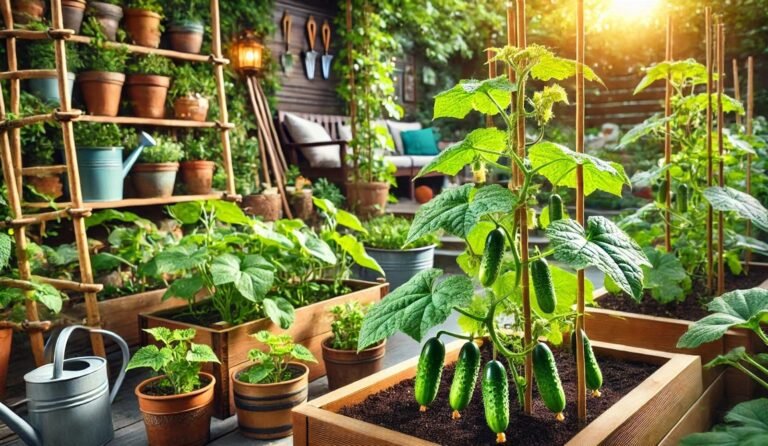Is Coffee Ground Good for Tomato Plants? A Beginner’s Guide
Is coffee ground good for tomato plants? If you’ve been tossing your coffee grounds without a second thought, you might be missing out on a gardening hack. These little brown leftovers could be the secret ingredient your tomato plants need to thrive. But can coffee really make a difference in your soil? And is there a right way to use it without harming your plants? Let’s break it down and find out how your morning brew can give your tomatoes a serious boost.
Can Coffee Grounds Help Your Tomato Plants Thrive?
Is coffee ground good for tomato plants? Coffee grounds are an organic material rich in nutrients, making them a great addition to your tomato garden when used correctly. But how exactly do they help your plants thrive?
Benefits of Coffee Grounds for Tomato Plants
Nutrient Enrichment: Coffee grounds are a natural source of nitrogen, an essential nutrient that promotes healthy foliage and plant growth.
Moisture Retention: As mulch, coffee grounds help the soil retain moisture, reducing the need for frequent watering.
Improved Soil Structure: When mixed into the soil, coffee grounds enhance its aeration and water retention, ensuring your tomato plants have a supportive environment to grow.
Natural Pest Deterrent: Slugs and snails, which often attack tomato plants, dislike coffee grounds, making them a natural barrier.
Eco-Friendly Gardening: Using coffee grounds reduces waste and contributes to sustainable gardening practices.
Best Practices for Using Coffee Grounds
- Use brewed coffee grounds, as they are less acidic than fresh grounds.
- Avoid applying large quantities directly to the soil to prevent nutrient overload.
- Always mix coffee grounds with compost or soil to balance nutrients.
Quick Tip:
To avoid attracting pests or mold, let coffee grounds dry before applying them to your garden.
Nutritional Profile of Coffee Grounds
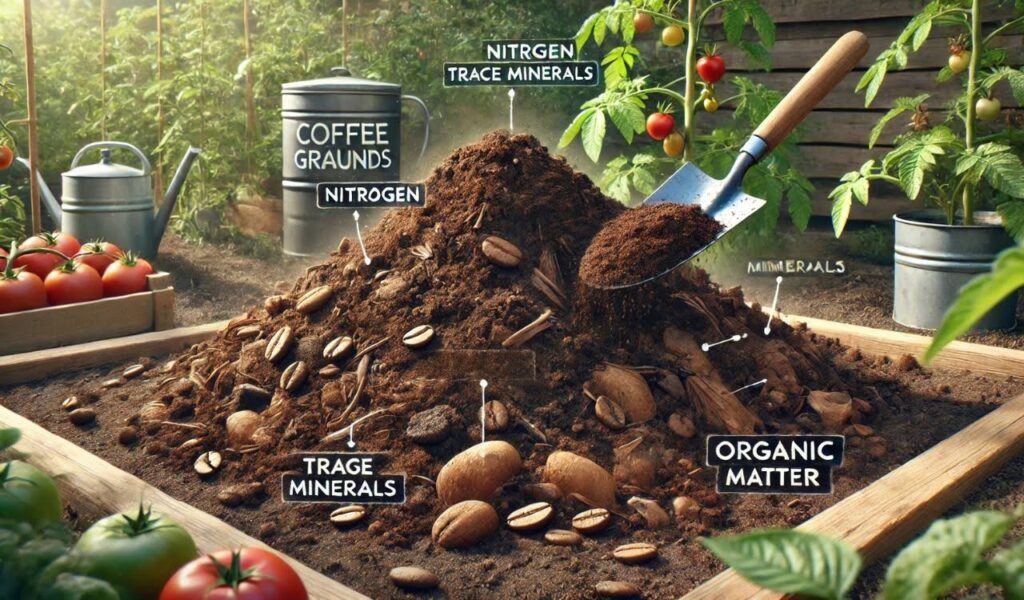
The secret to the benefits of coffee grounds lies in their nutritional composition. These humble grounds are packed with nutrients that tomato plants need to grow strong and produce fruit.
Key Nutrients in Coffee Grounds
Nitrogen: Encourages lush green growth, making it ideal for tomato foliage.
Trace Minerals: Includes potassium, phosphorus, magnesium, and calcium, which support overall plant health.
Organic Matter: Improves soil structure, boosts microbial activity, and aids nutrient absorption.
How Coffee Grounds Improve Soil Health
- Coffee grounds act as a slow-release fertilizer, delivering nutrients to the soil over time.
- They improve drainage in heavy soils while retaining moisture in sandy soils.
- The organic matter in coffee grounds encourages earthworms and beneficial microbes, which further enrich the soil.
How to Use Coffee Grounds for Tomato Plants
Compost coffee grounds to neutralize their acidity and create a balanced fertilizer. Mix small amounts directly into the soil or sprinkle lightly on the surface.
Is Coffee Ground Good for Tomato Plants?
Let’s dive into the pros and cons of using coffee grounds to determine if they’re truly beneficial for tomato plants.
Pros of Coffee Grounds for Tomato Plants
Boost Soil Nutrients: Provides essential nutrients for plant growth.
Natural Mulch: Helps suppress weeds and retain soil moisture.
Pest Repellent: Keeps slugs and snails away from tomato plants.
Sustainability: Promotes waste reduction and eco-friendly gardening.
Cons of Coffee Grounds for Tomato Plants
Overuse Risks: Excess nitrogen can result in too much leafy growth and fewer fruits.
Soil Imbalance: Coffee grounds alone cannot provide a full spectrum of nutrients.
Potential for Mold: Applying wet grounds can lead to mold growth, which can attract pests.
Pro Tip: To balance the nutrients, combine coffee grounds with other organic materials like compost or aged manure.
How to Use Coffee Grounds for Tomato Plants Effectively
Using coffee grounds effectively requires knowledge and the right techniques. Here’s how you can incorporate them into your tomato-growing routine:
Step 1: Composting Coffee Grounds for Best Results
Composting is the best way to use coffee grounds. Combine coffee grounds with other green materials (like vegetable scraps) and brown materials (like dried leaves or straw). Turn the compost regularly to speed up decomposition and prevent compaction.
Step 2: Mixing Coffee Grounds Directly into the Soil
Mix used coffee grounds into the top few inches of garden soil. Limit the quantity to avoid overwhelming the soil with nitrogen.
Step 3: Mulching Tomato Plants with Coffee Grounds
Spread a thin layer of coffee grounds (about ½ inch) around the base of your tomato plants. Cover with a layer of straw or wood chips to create a balanced mulch.
Step 4: Brewing Coffee Ground Tea for Your Tomatoes
Soak 1 cup of used coffee grounds in a gallon of water for 24 hours. Strain the mixture and use it to water your tomato plants, providing a nutrient-rich boost.
Are Coffee Grounds Too Acidic for Tomato Plants?
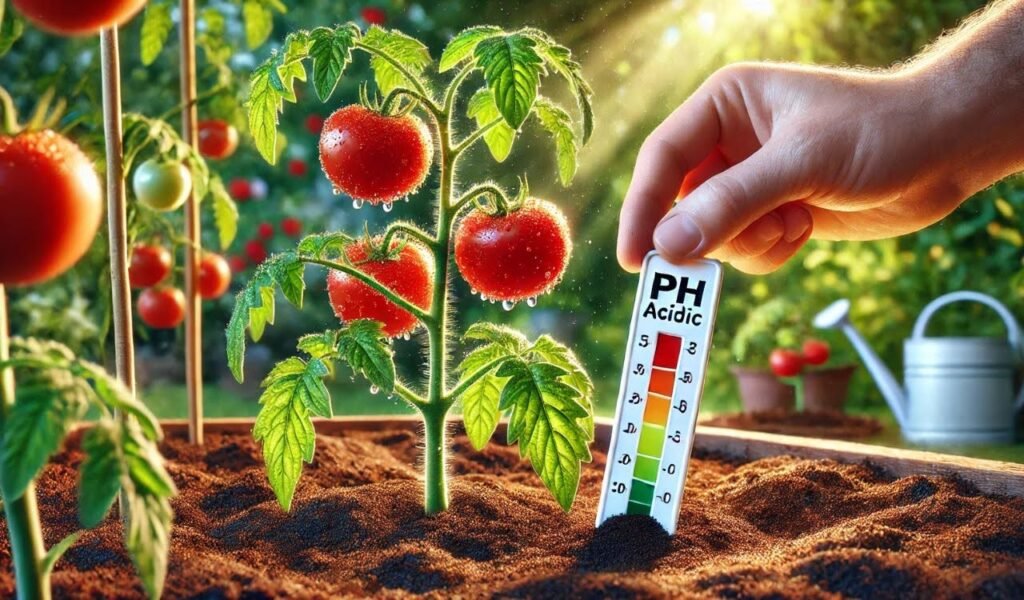
One of the most common concerns is whether coffee grounds are too acidic for tomatoes. Let’s clarify this misconception.
Brewed vs. Fresh Coffee Grounds
Fresh Coffee Grounds: These have a pH between 4.5 and 6.0, making them acidic. They should be composted before use.
Brewed Coffee Grounds: These are closer to neutral pH (6.5 to 6.8) and are generally safe for most garden soils.
Soil Testing for Tomatoes
Test your soil’s pH before applying coffee grounds. Tomatoes thrive in slightly acidic to neutral soil (pH 6.0–7.0). Adjust soil amendments accordingly to maintain the ideal pH balance.
Can Coffee Grounds Replace Traditional Fertilizers for Tomatoes?
While coffee grounds are a great addition to your garden, they cannot fully replace traditional fertilizers.
Benefits of Coffee Grounds as an Organic Fertilizer
Coffee grounds act as a slow-release fertilizer, providing essential nutrients like nitrogen, potassium, and phosphorus to tomato plants over time, promoting healthy growth and fruit production. Adding coffee grounds to the soil increases the organic matter content, which helps improve soil structure, water retention, and nutrient availability for tomato plants. Coffee grounds can help improve water retention in the soil, ensuring that tomato plants have access to moisture during dry periods.
Limitations
Coffee grounds have a tendency to hold onto moisture, creating a damp environment that promotes the growth of fungi, including harmful ones that cause diseases like mold or fungal rot. The slow decomposition rate of coffee grounds can contribute to the problem. As they break down, they can create pockets of organic matter where fungal spores can thrive, exacerbating the risk of fungal diseases in the soil. They work best as a supplement rather than a standalone fertilizer.
Not all coffee is created equal
And one more thing, remember that not all coffees are created equal when it comes to gardening. Generally, any type of coffee grounds can be used, but some coffee beans may be a better food source for tomato plant growth than others. For example, organic, unflavored coffee grounds are typically the best choice, as they contain fewer additives and chemicals. Avoid using flavored or artificially processed coffee grounds, as these may not provide the same benefits and could even harm your plants.
Tomato Plants and Coffee Grounds: Real-Life Tips and Advice
Here are some practical tips for using coffee grounds in your tomato garden:
Balancing Coffee Grounds with Other Fertilizers
Use coffee grounds alongside compost, bone meal, or fish emulsion to ensure a balanced nutrient profile. Monitor plant growth for signs of over-fertilization, such as excessive foliage or stunted fruiting.
Avoiding Overuse or Fresh Coffee Grounds
Fresh grounds should always be composted before application to neutralize acidity. Overusing coffee grounds can lead to nitrogen overload and compacted soil.
Using Coffee Grounds for Indoor Tomato Plants
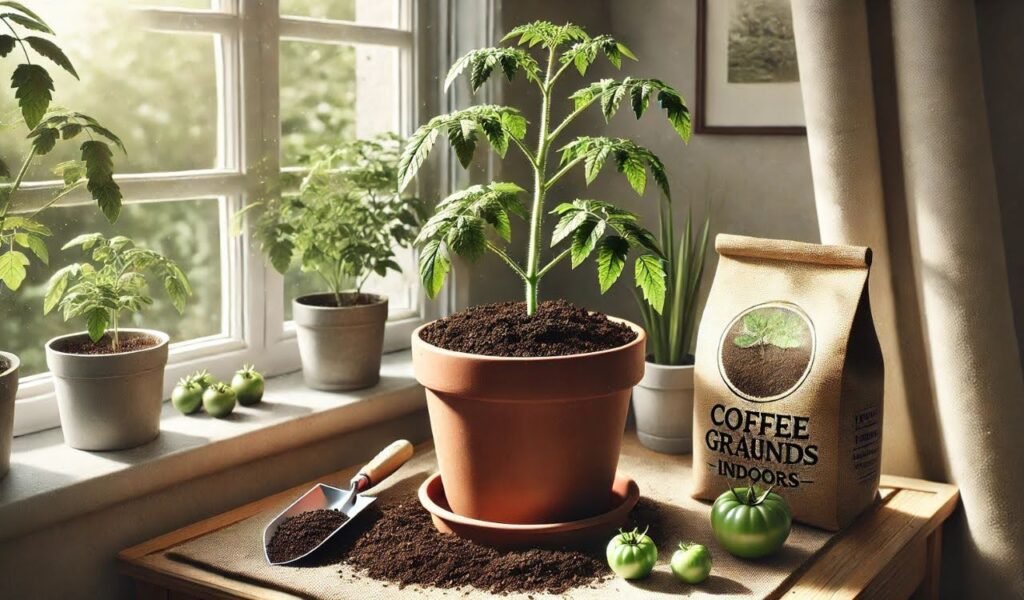
If you’re growing tomatoes indoors, coffee grounds can still be beneficial.
Tips for Indoor Use
- Mix coffee grounds with potting soil in a 1:3 ratio for improved aeration and drainage.
- Avoid applying coffee grounds directly to the soil surface to prevent mold growth.
- Use coffee ground tea as a liquid fertilizer, applying it sparingly to avoid overwatering.
Common Mistakes to Avoid When Using Coffee Grounds
Mistake 1: Overloading Soil with Coffee Grounds
Applying too much can lead to compaction, poor drainage, and nutrient imbalances.
Mistake 2: Using Fresh Coffee Grounds
Fresh coffee grounds are too acidic and may harm plants if used directly.
Mistake 3: Neglecting Soil Testing
Applying coffee grounds without knowing your soil’s pH can cause unintended issues, such as nutrient lockout.
FAQ
Can you put coffee grounds around tomato plants?
Yes, but use them sparingly as mulch or mix them into compost first.
How much coffee grounds should I use?
A thin layer (about ½ inch) or a small handful per plant is sufficient.
Do coffee grounds attract pests?
Properly dried coffee grounds can deter pests like slugs and snails. However, wet grounds may attract ants or mold.
Can coffee grounds be used on all types of soil for tomato plants?
Coffee grounds work well on most soil types but are especially beneficial for sandy or loamy soils. However, avoid using them excessively on clay soil, as they can lead to compaction. Always test your soil’s pH to ensure compatibility with coffee grounds.
How often should I add coffee grounds to my tomato plants?
Use coffee grounds sparingly, applying them about once every two to three weeks. Overuse can lead to nitrogen buildup, which may hinder fruit production. Composting them first can help regulate nutrient release.
Will coffee grounds harm young tomato plants?
Fresh coffee grounds can be too strong for young plants due to their acidity and high nitrogen content. It’s better to use composted coffee grounds or apply in small, diluted amounts to avoid stressing the plants.
Can I use coffee grounds with other fertilizers?
Yes, coffee grounds pair well with other fertilizers like bone meal, fish emulsion, or aged manure. Combining them creates a more balanced nutrient mix for healthy tomato growth.
Final Thoughts
Using coffee grounds in your tomato garden is a simple and sustainable way to improve soil health, provide nutrients, and protect your plants. While coffee grounds offer many benefits, they should be used in moderation and as part of a balanced gardening routine. With proper knowledge and application, coffee grounds can help you grow thriving, fruitful tomato plants. So, the next time you brew a cup of coffee, think twice before tossing the grounds—they could be the secret to your garden’s success!

